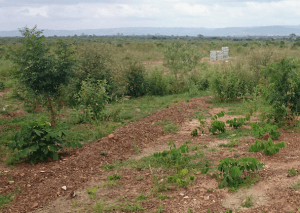New Land Act will protect gender rights – Minister
 The Ministry of Lands and Natural Resources through the Land Administration Project (LAP) is incorporating gender land right issues into the New Draft Land Bill to protect the interest of the vulnerable in society.
The Ministry of Lands and Natural Resources through the Land Administration Project (LAP) is incorporating gender land right issues into the New Draft Land Bill to protect the interest of the vulnerable in society.
“The Draft Bill has made provision for properties acquired during marriage to be registered in the joint names of the spouses. Where only one spouse is registered for such property, a provision has been made to the effect that such properties acquired during marriage are being held in trust for both spouses.
“In the case of a property from which the family derives its sustenance, there is a provision to prohibit the transfer of such property without the consent of the spouses. These provisions, and many more, have been made to protect the interest of women and vulnerable dependents”, Ms Barbra Serwaa Asamoah, Deputy Minister of Lands and Natural Resources has announced.
Speaking at a National Policy Dialogue held in Accra on Monday, Ms Asamoah said while public consultations continues to be held on the Bill, civil society organisations and other stakeholders should help in reviewing the Bill and make critical inputs to ensure that it provides security of tenure and inclusion of women in land administration and management systems.
The two-day dialogue is being organised by the Network for Women’s Rights in Ghana (NETRIGHT) in collaboration with the International Institute for Environment and Development (IIED).
It is aimed at enhancing advocacy on gender equitable land governance to effect gender transformation in land governance legislations, systems and structures at the community, district, regional and national levels.
The theme for the Dialogue is: “Enhancing Women Voice and Presentation in Land Governance in Ghana”.
Ms Asamoah said LAP was introduced in 2003 to provide an efficient land administration management system that is fair, efficient, transparent, decentralised and sustainable, saying, many achievements have been earned under LAP.
She said for instance, a comprehensive assessment of the capacity needs including the gender capacity needs of land sector agencies’ and the implementation of a human resource plan to address the gaps to prove women’s technical capacities alongside men in the land sector agencies have been done.
Ms Asamoah said at the customary level, the Ministry has supported the establishment of a total of 57 Customary Land Secretariats across the country to improve the management and administration of lands held by stools, skins, families and clans at the local level.
She announced that 30 more secretariats were to be established by the end of the year.
She said the project is also demarcating rural farmlands in selected communities in the Western, Ashanti and Brong Ahafo Regions to improve tenure security and reduce conflicts due to encroachment and protected litigation.
“Given that women are the largest proportion of food crop farmers in the country, this exercise will afford them the opportunity to register and obtain some form of documentation to their land”, Ms Asamoah said.
She expressed the hope that the outcome of the dialogue, would be useful for the review of the Land Bill which is still being discussed among stakeholders before it would be sent to the Ministry for onward submission to Parliament.
Nana Kojo Banafo II, Akwamu- Hene of Awutu Traditional Area, supported the idea of more engagement with chiefs, queen mothers, family heads and other opinion leaders on land issues and explain to them the importance to allow women to own and register lands in their names to strengthen women empowerment and development.
Mr Ebenezar Kyei Bediako, Acting National Coordinator of Civil Society Coalition on Land (CICOL), said the Land Bill, when passed into law, would be a sure way of ensuring efficient and effective land governance and administration in Ghana.
He urged all stakeholders to work harder to ensure that the Bill is passed into law on time to address all bottlenecks of land administration in the country.
Source: GNA
